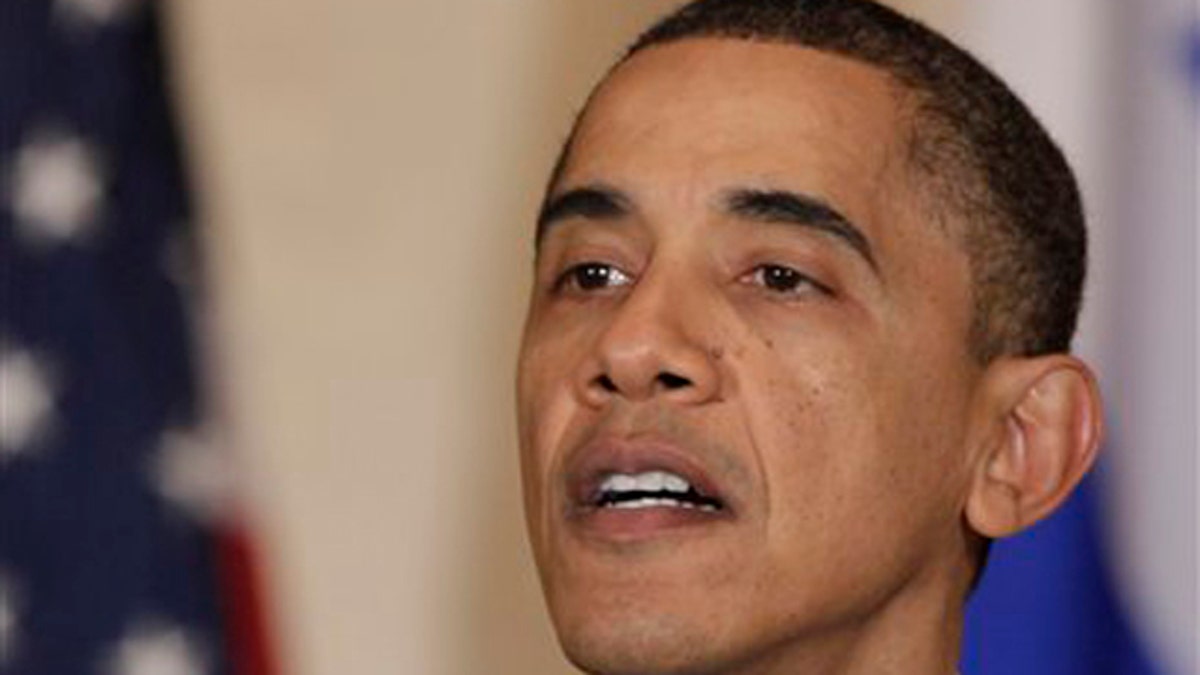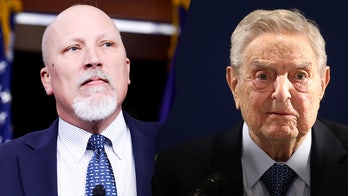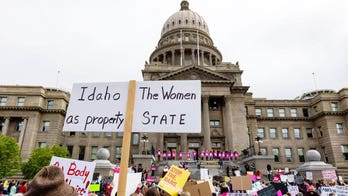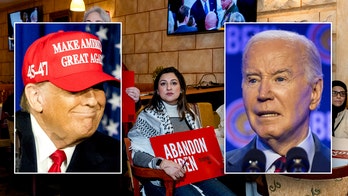
President Obama speaks at an event commemorating Greek Independence Day in the East Room of the White House March 25 in Washington. (AP)
President Obama faced mounting pressure Sunday to make crystal clear what the United States' intentions are in Libya, as he prepared to deliver an address to the nation that could go a long way toward determining whether the public views his actions as reckless or just.
Despite the planned address, the administration continued to send out mixed signals Sunday about the direction and purpose of the mission in Libya. Obama said Saturday that intervening in Libya was "in our national interest," but then Defense Secretary Robert Gates said the conflict, while of interest to the United States, was "not a vital national interest."
Then Secretary of State Hillary Clinton said the strife was, rather, a "vital" interest to the United States' allies in Europe.
The back-and-forth continued to complicate a messy administration message, one that insists Libyan leader Muammar al-Qaddafi should relinquish power, but at the same time stresses that U.S. military might is not meant to achieve that goal.
"It's no wonder that Americans are confused," Sen. John McCain, R-Ariz., said on "Fox News Sunday." "The president, I hope, would clarify that in his speech on Monday night."
NATO on Sunday agreed to assume command for the air strikes in Libya, something the administration was hoping it would do. The president's speech now gives him an opportunity, if he chooses, to be more direct with the American people about a conflict some say amounts to America's third war in a Muslim nation, though the administration is not calling it that. The intervention happens to come just as potential Republican candidates move toward announcing their intentions for 2012 -- those politicians have been particularly critical of the president's actions and words.
Former House Speaker Newt Gingrich, among them, pulled no punches in calling on Obama to do a better job explaining the United States' mission Monday. He said Obama should be "unequivocal" in stating that the goal of the current campaign is to oust Qaddafi.
"I hope the president tomorrow night will be dramatically clearer than he has been up to now," Gingrich told "Fox News Sunday." Gingrich has faced criticism of his own for giving seemingly conflicting statements about Libya, but said Sunday now that the United States is involved, the country should use its power to get rid of Qaddafi quickly.
The president, meanwhile, also faces questions about why he did not seek permission from Congress to send in the U.S. military. Ahead of the address, Gates and Clinton gave three interviews Sunday in which they defended Obama's actions.
Clinton stressed that time was a factor. She said the administration would "welcome congressional support," but suggested that the internationally authorized mission did not need congressional approval. She said that if the United States had not acted, thousands could have been slaughtered and, "The cries would be, 'why did the United States not do anything?'"
She added, "Every decision we make is going to have pluses and minuses."
Gates and Clinton spoke on ABC's "This Week," CBS' "Face the Nation," and NBC's "Meet the Press." Both Cabinet officials stressed that significant gains are being made against Qaddafi's forces and that NATO will soon be assuming the brunt of the mission.
And Gates reiterated that the point of the military campaign is not to oust Qaddafi.
"It was never part of the military mission," he said, explaining that international leaders wanted to craft a mission that was achievable in a limited period of time.
"Regime change is a very complicated business that sometimes takes a long time," Gates said.
Still, he would not predict how long the United States might be involved in the current conflict.
Other lawmakers have slammed Obama for the decision to intervene, and for not seeking congressional permission first. Rep. Dennis Kucinich, D-Ohio, and others are trying to defund the military campaign, while some are calling for an imminent vote in Congress on authorization.
On the other end are calls to commit to Qaddafi's ouster, only without using U.S. ground forces.
McCain, who was pushing for a no-fly zone weeks before it was approved, argued that Libya matters enormously to the United States -- because allied involvement sends a signal to other dictators that it's not okay to massacre their own people.
"This is a moment of historic proportions," McCain said. "And this will give us a golden opportunity to help with democracy and freedom throughout the Arab world."
Sen. Joe Lieberman, I-Conn., also stressed the importance of the mission.
"These revolutions ... are the most profound repudiation of Al Qaeda and Iran, who represent the most serious threats to American security in the world today," he said.




